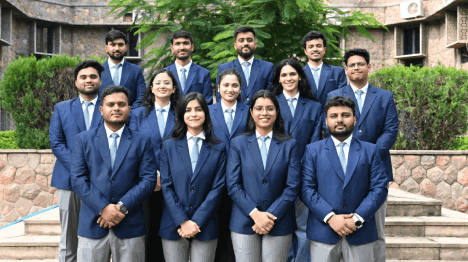- About Us
-
Academics
Schools
Programs
General Information
-
Faculty
The faculty members and researchers working at IIHMR University come from varied backgrounds including, but not limited to medicine, public health, management, economics, statistics, demography, human geography, social and behavioral sciences, rural development and pharmaceuticals.
-
Admissions
- Research
Publications & Journal
- Executive Education
Executive Programmes
- Online Certification Courses
ONLINE CERTIFICATION Courses
- Training
- Placements
- Contact
- Pradanya
- Blog
- Fee Payment
- NAAC
- IQAC
- NIRF
-
About Us
- About IIHMR University
- Board of Management
- Academic Council
- Board of Studies
- Research Board
- Institutional Review Board
- Finance & Audit Committee
- Departmental Research Committee
- Chairperson's Message
- President's Message
- IIHMR University Act
- Infrastructure
- Collaboration
- Ranking
- Board of Studies (School of Digital Health)
- Awards & Accolades
-
Academics
- Institute of Health Management Research
- School of Pharmaceutical Management
- ML Mehta School of Development Studies
- School of Digital Health
- SD Gupta School of Public Health
- MBA (Hospital and Health Management)
- MBA (Pharmaceutical Management)
- MBA (Development Management)
- MBA (Healthcare Analytics)
- Master of Public Health
- Student Manual – Cohort 9 (2021-2023)
- Master of Public Health (Offered by Johns Hopkins Bloomberg School of Public Health, USA in cooperation with IIHMR University, Jaipur, India)
- Ph. D.
- MBA CSR & ESG Management (Executive)
- MBA Sustainable Business Management (Executive)
- Common Information for all the Programs
- Academic Calendar
- Student Handbook 2020-21
- Committees
- Policies
- Annual Exam Calendar
- Library
- Faculty
- Officers of University
- Dean of Institute of Health Management Research
- Dean of School of Pharmaceutical Management
- Dean of School of Development Studies
- Dean of SD Gupta School of Public Health
- Dean of School of Digital Health
- School of Digital Health
- Faculty List A to Z
- Faculty List Designation Wise
- Faculty List School Wise
- Admissions
- Research
- Executive Education
- Training
- Placements
- Alumni
- Events
- Job Openings
- Contact
- Research
Promoting EmOC at Periphery Level: An Evaluation Study in BDCS of Rajasthan and Maharashtra
Agency : UNICEF, India Country Office
This evaluation study was undertaken with a specific aim to assess the impact of the Women's Right to Life and Health (WRLH) project on the access to, and the availability, quality and utilisation of emergency obstetric care services through the UN process indicators. The present study used an evaluation synthesis design with a hundred percent coverage of all maternal health institutions, irrespective of their size and locality, or whether they were private or public. The institutions were selected from each of the WRLH project sites. The outcomes were discussed in terms of access to the availability, and utilization of services, met needs and case fatality rate.
The evaluation findings supported the results of the WRLH project experiences and extended our learning on how small focussed maternal health promotion programmes can increase health facility activity and build the capacity of key stakeholders involved in these efforts. The evaluation team also learned that the WRLH initiatives faced many challenges in (a) designing and implementing realistic yet effective programmes, (b) working within environments that were resource poor, and (c) building the necessary infrastructure and community support to enhance programme sustainability. Unlike many large-scale initiatives that focused on single health issues or used common approaches for their interventions, the WRLH project is noteworthy in the sense that small-scale maternal health promotional activities implemented a wide variety of interventions targeting various stakeholders in a given setting. This made the evaluation quite challenging in terms of our ability to derive general observation from what on the surface appeared to be 'black and white'.



